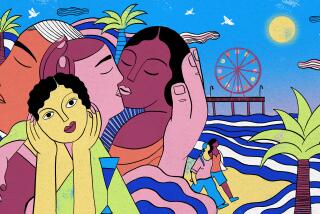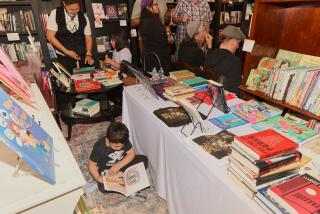‘Writing Los Angeles’ goes Hollywood
Resplendent in sport coat, tie and black high-top sneakers, David Ulin eyed his new surroundings and found them pleasing, but strange. The Picassos on the living-room wall. The outdoor bar beside the lap pool. The well-attired guests spearing plump sauteed shrimp off passing platters.
It was all so elegant, so Hollywood Hills, so unlike the back room of his house where Ulin spent months getting paid “to sit on my [derriere],” he joked, pulling together the literary anthology “Writing Los Angeles.”
Hosted by Pulitzer Prize-winning biographer A. Scott Berg (“Lindbergh”) and his partner, Kevin McCormick, executive vice-president of production at Warner Bros. Films, the Tuesday soiree had two purposes: to celebrate the book’s publication and to serve as a coming-out party for the idea that durable writing can emerge from a city founded on ephemera.
The crowd of 150, an artfully chosen miscellany of socialites, screenwriters, novelists, Industry VIPs, literary agents and a trust-fund baby or two, mixed easily, though not without a sense of “What-am-I-doing-here?” among some of the writers. “It’s not our usual milieu,” said Ulin, savoring the experience. “If this were just us, we’d be drinking Ripple out of paper bags,” said Bernard Cooper, whose work is included in the new collection.
Conceived by the prestigious Library of America and dedicated to the proposition that local belles-lettres have come a long way since Helen Hunt Jackson’s “Ramona,” “Writing Los Angeles” assembles the work of more than 70 fiction authors, poets, essayists, diarists and journalists, from the caustic (Bertolt Brecht) to the sensual (M.F.K. Fisher) to the urban-apocalyptic (you pick ‘em).
Cheryl Hurley, president of the Library of America, said that after issuing an anthology of New York writing a few years ago, the nonprofit publisher decided to take on L.A. Best known for its handsome editions of the American literary canon, the organization is eager to make marketing inroads in Southern California where, Hurley told the attendees, “there’s not enough people who know about the Library of America.”
Hurley’s colleague, Library of America publisher Max Rudin, agreed, but thought that the situation could change. “This is the most Hollywood party we’ve ever been to,” he said, positioning himself between the staircase and a grand piano. “Hopefully we’ll have some more friends out here. Scott is our secret weapon on the West Coast.”
Berg, who serves on the Library’s board of directors, said that most outsiders think of L.A. as a movie, not a literary, town. “I think with this book people are going to start to get it.”
A few feet away, Linda Bruckheimer, a bestselling novelist (“Dreaming Southern”), said she hadn’t had a chance to peruse “Writing L.A.” but was looking forward to it. “I’m always interested in how writers see Los Angeles because it’s not an easy city to categorize,” she said.
Which writer had come closest to capturing it, she was asked? “Joan Didion,” Bruckheimer said without hesitation. “She gets that time and place of Los Angeles. It gives me goose bumps,” she said. “Her use of words is phenomenal,” added her husband, Hollywood mega-producer Jerry Bruckheimer.
For some, the party was the type of finely considered anomaly that might’ve sprung from Didion’s own pen. “It’s sort of a meeting of the minds,” said Robert Kovacik, West Coast correspondent for the National Geographic Channel. “It’s rare to see a meeting of the minds in Hollywood.”
“There are so few of them,” put in Lynne Giler, a National Geographic TV producer.
As the city’s lights blazed below the hills, and the catering crew plucked empty glasses and rumpled cocktail napkins, it appeared that L.A.’s men and women of letters were adjusting to their new milieu just fine.
More to Read
Sign up for our Book Club newsletter
Get the latest news, events and more from the Los Angeles Times Book Club, and help us get L.A. reading and talking.
You may occasionally receive promotional content from the Los Angeles Times.









